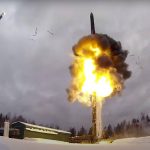Israel Defense Ministry Director General Eyal Zamir today signed the second part of the agreement for the acquisition by Germany of the Arrow 3 missile defense system, valued at approximately $3.6 billion.
IMOD Director General, MG (Res) Eyal Zamir, signed the agreement for Germany’s acquisition of the Arrow 3 missile defense system today, valued at approx. $3.6 billion. >> pic.twitter.com/pelIZffRQB
— Ministry of Defense (@Israel_MOD) November 23, 2023
This milestone, marked by the final signing carried out by German and Israeli officials, concludes the procurement process that began with Defense Minister Yoav Gallant’s visit to Germany in September 2023, where the first part of the agreement was signed.
According to the contract, the first battery of the Arrow 3 system will be delivered to the German Ministry of Defense by the end of 2025. The Arrow 3 interceptor system produced by the Israeli firm IAI was selected over the THAAD, made by the American Lockheed Martin, to shield Germany from Russian ballistic missiles.
Arrow 3 exoatmospheric interceptor
Arrow 3 is a state-of-the-art air defense system for intercepting ballistic missiles in space, outside the atmosphere. During Israel’s ongoing war against Hamas, the Arrow 3 system carried out its first-ever operational interception when it destroyed a target fired at Israel over the Red Sea.
See also: Israeli F-35I shoots down a cruise missile for the first time
The Super Greene Pine early detection and interception radars of the German Arrow system would be installed at three locations in Germany. The power of these radars is such that they can maintain 24-hour surveillance over the airspace of Poland, Romania and the Baltic countries.
European missile shield
Israeli Arrow systems will form a key part of the future European missile shield system, promoted under the «European Sky Shield Initiative» (ESSI) proposed by Germany.
The initiative will enable all participating nations to jointly develop an air defense system using interoperable, off-the-shelf solutions. This multi-national, multi-faceted approach offers nations a flexible and scalable way to strengthen their deterrence and defense in an efficient and cost-effective manner.
In October 2022, the defense ministers of 15 NATO member nations signed a Letter of Intent in Brussels to participate in and develop the German Common European Missile Shield initiative. Austria and Switzerland, despite maintaining their neutral status and not belonging to the Atlantic alliance, did not want to be left out of the defense umbrella and also signed a declaration of intent to participate in the ESSI.














